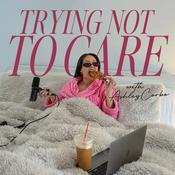Your Parenting Mojo - Respectful, research-based parenting ideas to help kids thrive
Jen Lumanlan

Latest episode
304 episodes
Episode Summary 07: Is Your Child’s Behavior Really a Disorder? A Psychiatrist Explains
19/1/2026 | 20 mins.When your child struggles with behavior or attention, doctors might suggest ADHD medication. Before you move forward, you should know what a psychiatric diagnosis actually is - and what it isn't.
This episode examines how psychiatric diagnoses actually work - and what they don't tell you. Dr. Sami Timimi, a child and adolescent psychiatrist in the UK, explains how the mental health system has become an industrial complex that profits from turning distress into diagnoses.
You'll learn why a diagnosis doesn't mean doctors have found something wrong with your child's brain, and why the framework we use to understand mental health struggles might be missing the bigger picture. If you've ever felt pressured to medicate your child or wondered whether there's more to the story than a "chemical imbalance", this conversation will give you the information you didn't know you were missing.
Questions this episode will answer
What do you do when your child has a behavioral problem? Instead of immediately seeking a diagnosis, consider the social context - school environments, family stress, economic pressures, and whether your child's environment actually fits their needs. Addressing these factors can be more effective than focusing solely on fixing the individual child.
What is a psychiatric diagnosis evaluation? A psychiatric diagnosis evaluation is a process where behaviors are observed and categorized according to checklists, but it doesn't involve measuring anything in the brain or body. The diagnosis describes behaviors but doesn't explain what causes them.
Can ADHD be misdiagnosed? Since ADHD diagnosis relies on behavior checklists rather than objective tests, two evaluators can reach different conclusions about the same child. The behaviors labeled as ADHD - hyperactivity, inattention, impulsivity - are descriptions, not explanations of what's causing those behaviors.
What is the most common childhood behavioral disorder? ADHD is commonly diagnosed in children, but saying a child's hyperactivity is caused by a hyperactivity disorder is circular reasoning - we're just describing the behavior using medical language.
How does parenting affect mental health? Single parents and parents experiencing poverty face significant stressors that impact mental health. When parents seek help for depression or anxiety, they're often directed toward medication rather than receiving support that addresses the actual challenges they face - lack of resources, isolation, and overwhelming demands.
What are the biggest determinants of mental health? Social and economic factors - housing security, job stability, poverty, social support, and community resources - are major determinants of mental health. These environmental conditions create distress that often gets labeled as individual mental illness.
How can social factors affect your mental health? Social factors like economic insecurity, isolation, and the structure of our society create feelings of alienation and the sense that "I'm not good enough." When we say these problems are inside individuals rather than addressing social conditions, we miss opportunities to reduce distress at its source.
What does industrial complex mean in mental health? The mental health industrial complex refers to the entire ecosystem that profits from mental health diagnoses - from...- Welcome to 2026! In this episode, we're looking back at what we covered in 2025 and sharing what's coming in the year ahead.
A Year of Growth
2025 was a year of evolution for the podcast. We covered topics you've been asking about - parenting triggers, rage, overwhelm, boundaries, and breaking family trauma cycles. We also did a deep dive across four episodes into Dr. Jonathan Haidt’s book The Anxious Generation (which likely overstates the harm of social media on kids). There’s also a summary episode that covers all the main ideas from the four deep dives in just 17 minutes.
Based on feedback from the Podcast Advisory Council, we shifted to shorter public episodes while full-length episodes moved to the Parenting Membership's private feed. Our goal is to get you to the insights that matter faster.
2026: The Year of Mental Health
This year, we're going deep on mental health. What even is it? How can we support it in ourselves and our children? And how does it intersect with neurodivergence? I've already recorded the first episodes and I have to tell you - my mind has been blown by what I'm learning.
Big Changes Coming
The Parenting Membership is now open year-round with a new onboarding process. The website is getting a complete redesign with filters so you can search by your specific challenge and child's age. Plus 10 new starter videos explaining core concepts.
Episodes Mentioned
232: 10 game-changing parenting hacks – straight from master dog trainers
233: Time-outs: Helpful or harmful? Here's what the research says
234: The problem wit time outs: Why they fail , and what to do instead
235: Chidren's Threats: What they mean and how to respond
238: Feeling exhausted and overwhelmed? Tools to help you cope
241: Validating children's feelings: Why it's important, and how to do it with Dr. Caroline Fleck
The Anxious Generation
255: Why Do I Keep Snapping? Parenting Rage - Have you ever opened a gift from your parent and felt your stomach drop? You've tried everything - wishlists, clear conversations, explicit boundaries about gift giving. But the packages keep arriving, filled with things that feel totally opposite from your values.
And then you're stuck in this awful place where you're simultaneously angry at them for not respecting your boundaries AND judging yourself for not just being grateful.
In this episode, I'm sharing part of a powerful coaching conversation with Sam, who's spent years trying to set gift giving boundaries with her mom. What we discovered is that when unwanted gifts trigger us this intensely, they're touching something way deeper than clutter or consumption.
When I talked with Nedra Glover Tawwab recently, she advocated for very strong boundaries: if you get unwanted gifts, you send them back. How the other person feels about that is not your responsibility. You might decide that a hard boundary is the best option for you. But at the end of the day, it doesn’t address the hurt you’re feeling that is leading you to consider a boundary.
Through an embodiment exercise, Sam found empathy for her mom's needs while still honoring her own need to be truly seen. But the real breakthrough came when we talked about what to do when your parent simply can't give you what you long for - and why that requires grief work, and not always stronger boundaries.
Questions this episode will answer
Is it normal to have resentment for your parents over gifts? Yes. When unwanted gifts keep coming despite clear boundaries, that resentment often connects to a deeper need - wanting your parent to truly see and understand you.
What is the psychology behind excessive gift-giving? Gift givers are often trying to meet needs like staying relevant, feeling competent as a parent, creating connection, and mattering in their grandchildren's lives, especially when physical distance or other limitations exist.
How do you respond to unwanted gifts without losing your mind? You can't just decide the gifts don't bother you anymore. It may help to mourn the relationship you wished you had with your parent, and get your need to be seen met through other relationships.
What to do with unwanted gifts when boundaries keep failing? You can continue donating them through Buy Nothing groups, but the real shift happens when you stop attaching meaning to the gifts - when a dancing cactus becomes just a dancing cactus, not evidence that your parent doesn't see you.
How do you let go of anger and resentment towards a parent? Through embodied mourning rituals - not just making a decision in your head. This might involve gathering with people who truly see you and symbolically releasing the longed-for relationship you're acknowledging you won't have.
How do you set boundaries with parents when they won't respect them? Sometimes moving forward means you stop holding the door open, exhausting yourself while you wait for them to walk through it. You find other ways to meet your needs instead.
What you'll learn in this episode
Episode Summary 05: How to Enforce Boundaries When Someone Doesn’t Respect Them
10/11/2025 | 25 mins.You've told your parents you're not available during work hours. They keep calling anyway.
You've asked them not to comment on your weight. They bring it up again on the next visit.
You've said no to those random Amazon gifts. Another package arrives at your door.
Many parents know how to set boundaries, but get stuck when someone won't respect them. In this summary episode, therapist Nedra Glover Tawwab shares practical strategies for enforcing boundaries when people repeatedly ignore or dismiss them.
You'll learn about
the "fire extinguisher method" for stopping uncomfortable conversations before they spiral
how to embody your boundaries through your actions (not just your words)
how to navigate the especially tricky situation where you rely on someone for childcare but they won't respect your limits.
Nedra also discusses her new children's book and works through real scenarios about unwanted gifts, body-shaming comments, and what to do when setting a boundary means potentially losing support you need.
This conversation gets honest about the hard choices enforcing boundaries sometimes requires. Can you really maintain a boundary with someone you depend on? What do you do when the person provides childcare for you?
Nedra offers a clear framework for deciding when to stand firm, how to take action when words aren't working, and why allowing people to be upset with you is part of the process.
Questions this episode will answer
How do you deal with someone who doesn't respect boundaries? Enforce the boundary through your behavior, not just your words. If someone keeps calling during work hours after you've asked them not to, don't answer the phone. If they bring unwanted gifts, donate them immediately or return them to the gift-giver. You can't control what they do, but you can control what you do.
Why is setting boundaries so hard? We often learned in our families of origin that setting boundaries leads to rejection or anger. We worry about people being mad at us, the relationship ending, or being seen as selfish. These fears come from early experiences where our caregivers responded poorly when we tried to express our needs and boundaries.
How do you enforce boundaries when words aren't working? Use behavioral enforcement. Stop answering calls during the times you've said you're unavailable. Use the "fire extinguisher method" to interrupt conversations the moment they start heading toward topics you've said are off-limits. Show through your actions that you meant what you said.
What is the fire extinguisher method for boundaries? Jump in to stop conversations before they get going, the way you'd use a fire extinguisher on a small flame before it spreads. When someone starts bringing up a topic you've clearly said you won't discuss, interrupt them immediately: "I know where this is going, and I don’t want to talk about it.”
Why do people get upset when you set boundaries? Some people are used to being able to say or do whatever they want in the relationship. Your boundary ‘brushes up against’ their expectation of having full access to you or being able to speak freely. They may also genuinely believe you need to hear what they have to say.
Should you be with someone who doesn't respect your boundaries? This depends on the severity of the violation and your level of dependence. If someone provides childcare but also body shames you, you may need to find alternative childcare to truly maintain the boundary. Sometimes you have to choose between the support someone offers and having your boundaries respected. You might accept that certain behaviors come as part of the "package," or you might want to reduce your...Do you ever wake up with tension in your body because you know your child will want to play the moment you walk out of your bedroom?
Do you spend time with your child but think about all the chores you should be doing instead?
Parent Aija came to a (FREE!) Beyond The Behavior coaching call with exactly this challenge. She plays with her four-and-a-half-year-old son a lot. But she doesn't enjoy it. And she has big feelings of guilt and shame about that.
What starts as a question about setting boundaries and making time for herself becomes something much deeper. We discover that Aija's struggle with play isn't really about play at all.
When we explore what makes Special Time so hard, we uncover sadness and grief that Aija didn't even realize was there. The messages she received as a child about productivity and being a "good" future wife and mother are still running in the background, making it really hard for her to be present with her son. But we also find three concrete strategies that help Aija see a way forward.
By the end of our conversation, her entire demeanor has shifted. She's smiling. She has a plan. We’ll uncover the key reasons why playing with our kids is hard, and how to get the most out of this important time.
Questions This Episode Will Answer
What is parenting guilt? Parenting guilt shows up when you think you "should" enjoy something but you don't. As Aija describes it: "I don't enjoy just spending time playing. My kids, that's terrible. But it seems that no matter how much Special Time we have, it's not enough for him." It's the gap between the parent you think you're supposed to be and the reality of your experience.
Why do I have parenting guilt about not enjoying play? Parenting guilt often comes from comparing yourself to others and from messages you received growing up. When Aija watches her husband play easily with their son, she thinks "I want to be like that" - but that comparison triggers shame, which makes it even harder to make decisions aligned with your values.
What is Special Time with your child? Special Time is consistent daily dedicated one-on-one time with your child where they get to choose the activity. The purpose is to meet their need for autonomy, along with their needs for connection, joy, and fun.
How is Special Time linked to my child’s behavior? Even just spending 10 minutes consistently with your child can have enormous benefits on their connection with you (and thus their behavior in situations outside of Special Time). Many of the behaviors that parents find irritating (resisting leaving the house in the morning, annoying behaviors, hitting siblings, bedtime stalling) are kids’ best attempt to connect with us - when they do these things, we pay attention to them. When we do Special Time, they’ll likely stop using these behaviors to get your attention/connection.
What are the benefits of Special Time? Special Time meets your child's needs for connection, joy, play, and autonomy. When children get their connection needs met consistently, they're less likely to use challenging behaviors to get your attention. As we discover in Aija's situation, her son's morning behaviors (taking her bookmark, throwing blankets over her head) are his way of trying to get connection time.
How to do Special Time with kids? Special Time should ideally be 10 minutes of consistent daily play where the child gets to choose the activity. The consistency is really important. It’s much better to do 10 minutes daily than an hour on an unpredictable basis. This communicates to your child: “You’re special. I love you and I want to spend time with you.”
How to make...More Education podcasts
Trending Education podcasts
About Your Parenting Mojo - Respectful, research-based parenting ideas to help kids thrive
Parenting is hard…but does it have to be this hard? Wouldn’t it be better if your kids would stop pressing your buttons quite as often, and if there was a little more of you to go around (with maybe even some left over for yourself)? On the Your Parenting Mojo podcast, Jen Lumanlan M.S., M.Ed explores academic research on parenting and child development. But she doesn’t just tell you the results of the latest study - she interviews researchers at the top of their fields, and puts current information in the context of the decades of work that have come before it. An average episode reviews ~30 peer-reviewed sources, and analyzes how the research fits into our culture and values - she does all the work, so you don’t have to! Jen is the author of Parenting Beyond Power: How to Use Connection & Collaboration to Transform Your Family - and the World (Sasquatch/Penguin Random House). The podcast draws on the ideas from the book to give you practical, realistic strategies to get beyond today’s whack-a-mole of issues. Your Parenting Mojo also offers workshops and memberships to give you more support in implementing the ideas you hear on the show. The single idea that underlies all of the episodes is that our behavior is our best attempt to meet our needs. Your Parenting Mojo will help you to see through the confusing messages your child’s behavior is sending so you can parent with confidence: You’ll go from: “I don’t want to yell at you!” to “I’ve got a plan.” New episodes are released every other week - there's content for parents who have a baby on the way through kids of middle school age. Start listening now by exploring the rich library of episodes on meltdowns, sibling conflicts, parental burnout, screen time, eating vegetables, communication with your child - and your partner… and much much more!Podcast websiteListen to Your Parenting Mojo - Respectful, research-based parenting ideas to help kids thrive, Everyday Māori and many other podcasts from around the world with the radio.net app

Get the free radio.net app
- Stations and podcasts to bookmark
- Stream via Wi-Fi or Bluetooth
- Supports Carplay & Android Auto
- Many other app features
Get the free radio.net app
- Stations and podcasts to bookmark
- Stream via Wi-Fi or Bluetooth
- Supports Carplay & Android Auto
- Many other app features


Your Parenting Mojo - Respectful, research-based parenting ideas to help kids thrive
Scan code,
download the app,
start listening.

























